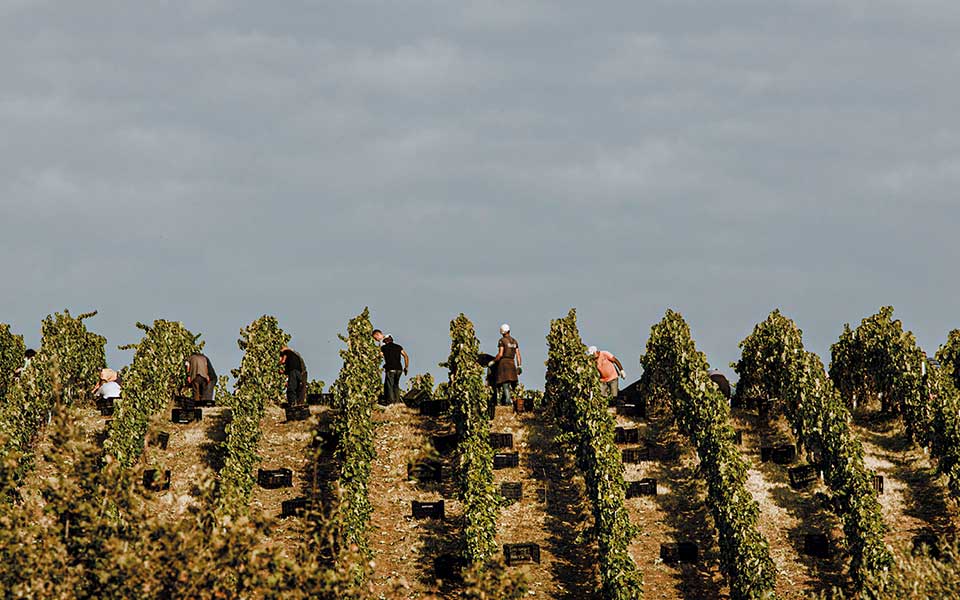We went to Naoussa during the final days of the grape harvest and invited the farmers to meet us for a group photo shoot. Almost all of them responded to our call, bringing along samples of their most recent Naoussa PDO vintages to be found on the market. We tried them all, accompanied by two sommeliers, Aris Sklavenitis and Afshin Molavi. Below you will find more information about the “fresh” Xinomavro produced by each winery.
Fountis Estate
The family’s first vineyard was planted in 1930 by grandfather Georgios, an Eastern Thrace native who had settled in the region. Until 1992, his descendants produced wine and tsipouro from Xinomavro grapes solely for domestic consumption. Nikos Fountis, a founding member of the Vaeni cooperative, decided to vinify his own grapes in the early 1990s, launching his first label in 1992. Today, he and his daughter, Georgia Founti, make approximately 50,000 bottles from a 65-acre privately owned vineyard. Their Xinomavro is produced using traditional red wine vinification techniques and aged for at least four years before it’s introduced to the market. Small quantities are exported to the United States, Japan, Hong Kong, Canada, and Belgium. A traditional Naoussa wine, both rustic and refined.
Info
Strantza, Tel. (+30) 23320.482.55

© Vicky Tsatsampa

© Vicky Tsatsampa
Melitzani Estate
One of the oldest wineries in Naoussa, it has been vinifying grapes from the organic vineyard on the hill of Gastra for four generations. The fourth generation of winemakers, descended from Naoussan cooper Dimitris Melitzanis, are self-taught and experienced, steeped in Naoussa’s traditional winemaking methods. They keep the tradition alive by producing limited quantities of old-school wines that are well-crafted, tasty, and distinctive. Stelios Yamalidis, his wife Elisavet, granddaughter of Dimitris, and their two children have been in charge of everything from vine care to sales for several years.
Info
M. Agra 14, Tel. (+30) 694.583.1472

© Vicky Tsatsampa

© Vicky Tsatsampa
Kelesidis Estate
The small family winery, which has been in operation since 1998, produces wines from low-yield organic vineyards that are manually harvested. On the day of our visit, the son was bringing the last crates of grapes from the vineyards for the father to sort in the courtyard, while the mother was serving two visitors from abroad in their winery-home. A family that is dedicated to their work, producing wines that strike a balance between traditional and modern Xinomavro profiles.
Info
Giannakohori, Tel. (+30) 23320.510.66
Argyrakis Estate
The family winery founded by oenologist Giorgos Argyrakis in Tripotamos produces expertly crafted wines with a modern style and distinctive character, maximizing the potential of Xinomavro. Giorgos’s oenologist son, Konstantinos, now works alongside his father. Despite its small size, the winery was designed to meet bioclimatic standards and reduce energy consumption by Giorgos’s other son, civil engineer Spyros Argyrakis. Their vineyards were planted in the limestone-clay soil of the sunny southeast slopes of Mount Vermio. They produce around 20,000 bottles, each bearing their distinctive horse logo.
Info
Tripotamos, Tel. (+30) 697.602.6970
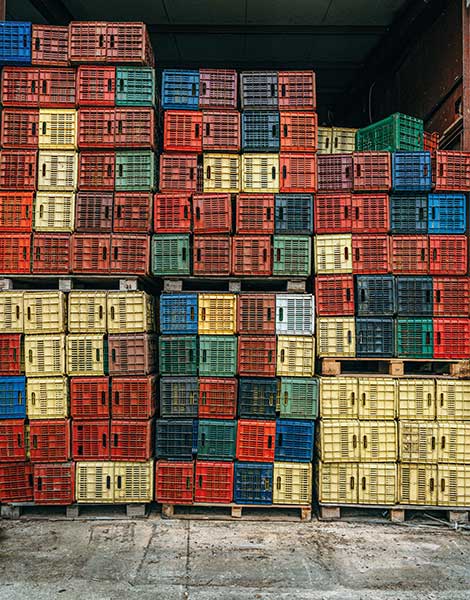
© Vicky Tsatsampa
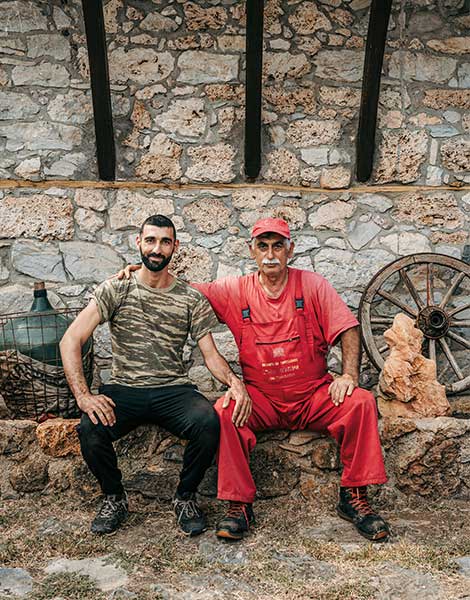
© Vicky Tsatsampa
Chrysochoou Estate
Chrysochoou Estate produces bold wines with strong tannins that can withstand the test of time. The Chrysochoou family’s winery and old vineyards are in Strantza, while the newer ones are in Gastra, on the southeast slopes of Mount Vermio, in the PDO zone. Their wines were first released in 1965, and they currently produce approximately 400,000 bottles per year. Besides Naoussa, the Prekniariko, a distinctive white wine produced from the region’s hard-to-find variety of the same name, is also quite interesting. The traditional winery building, with its atmospheric spaces and museum-like exhibits, is open to visitors.
Info
Strantza, Tel. (+30) 23320.450.80
Kokkinos Winery
Stavros Kokkinos bought his first vineyard in 1999. The winery was established in 2008 at the same site where his grandfather and father ran a poultry farm – the three roosters in the winery’s logo are an homage to the family’s history. His sons, oenologist George and food chemist Konstantinos, have also joined the business. They produce approximately 30,000 bottles annually. The younger generation have also started experimenting with Xinomavro, and we expect to see the results of their efforts in the near future.
Info
Dalamari, Tel. (+30) 23320.219.01
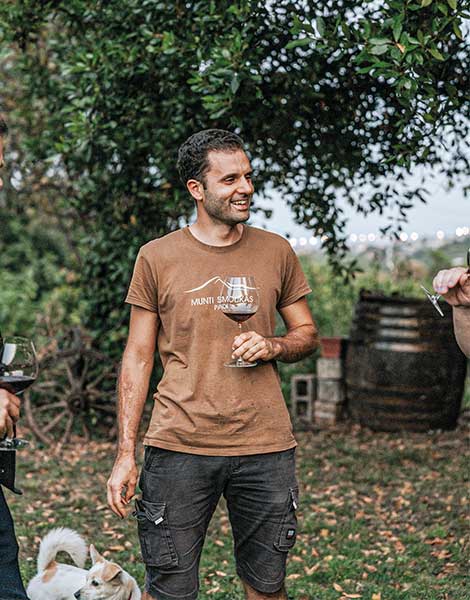
© Vicky Tsatsampa
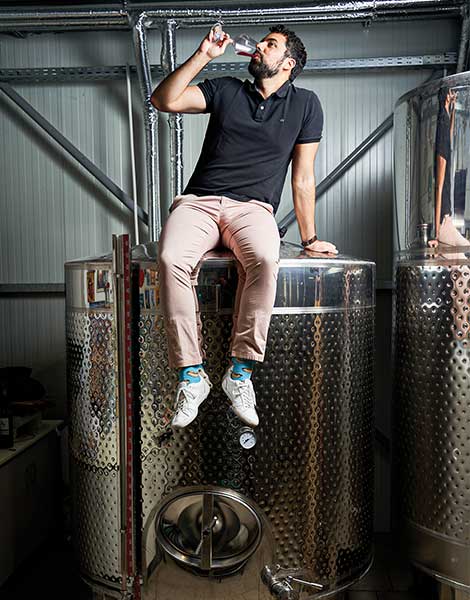
© Vicky Tsatsampa
Marantidi Winery
The small Marantidi Winery, owned by a family of oenologists, is located on the square of the Pontic village of Patrida in Imathia, about four kilometers from Veria. Their privately owned vineyards are spread throughout the villages of Patrida and Trilofos, producing wines from Xinomavro, Merlot, Mavroudi, and Roditis, one of which is Naoussa PDO.
Info
Patrida Imathias, Veria, Tel. (+30) 23310.266.68
Ktima Kir-Yianni
The Kir-Yianni Estate’s history is inextricably linked to that of Naoussa and the evolution of Greek winemaking. Kir-Yiannis established the estate in Giannakohori in 1997, leaving a legacy and an ambitious goal for wine as a national product, with Xinomavro serving as the flagship variety. Today, the vineyard adheres to the principles of integrated management, gradually implementing regenerative farming practices. The estate’s 415 acres produce 280,000 bottles and 11 labels, eight of which contain Xinomavro. Experimentation and microvinification have been ongoing for the past thirty years, and Antonis Kioseoglou is currently the estate’s head oenologist. The wines are exported to 50 countries.
Info
Giannakohori, Tel. (+30) 23320.511.00
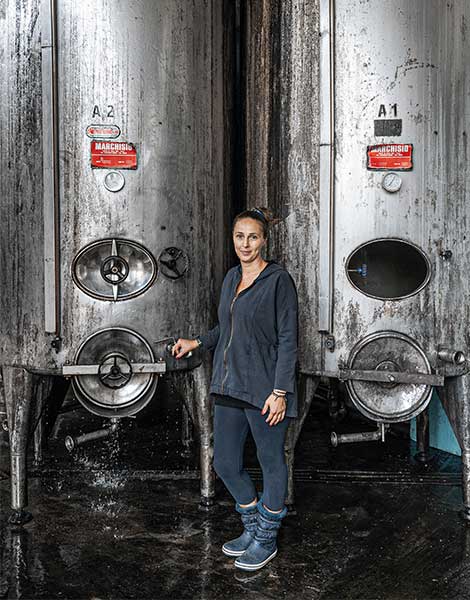
© Vicky Tsatsampa
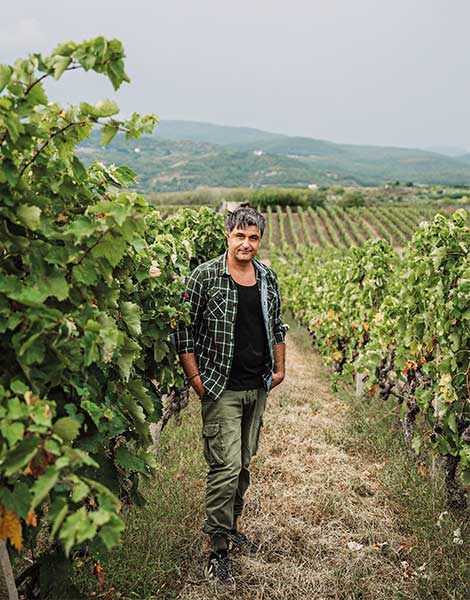
© Vicky Tsatsampa
Diamantakou Estate
Mademi, one of the most privileged areas in the Naoussa PDO zone, is located on the eastern foothills of Mount Vermio, at an elevation of 200-240 meters. There, in the small family winery, oenologist George Diamantakos produces only two labels from privately owned vineyards: one from Xinomavro and the other from the rare local variety Preknadi. Both wines are modern yet traditional, adding a new dimension to the established character of Naoussa wine, while retaining the distinct identity of the terroir and grape varieties.
Info
Mademi, Tel. (+30) 23320.286.23
Karydas Estate
Konstantinos Karydas planted 30 acres with Naoussa Xinomavro at an altitude of 205 meters on the sloping terrain of the hill of Gastra in 1978. His son Petros continues to manage the vineyard, which is one of the best in the region, and produces a single label and 12,000 bottles per year.
Info
Ano Gastra, Tel. (+30) 697.743.7592
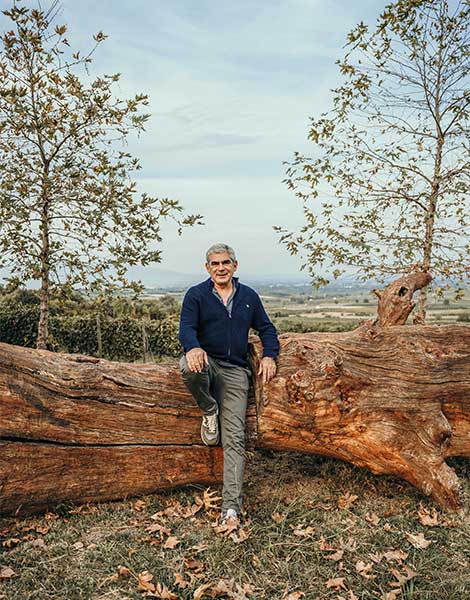
© Vicky Tsatsampa
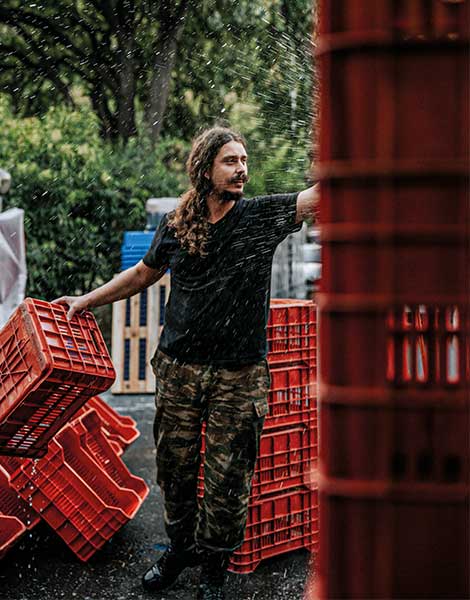
© Vicky Tsatsampa
Kastaniotis Estate
In 1976, Georgios Kastaniotis, a wine merchant with a wine shop in Naoussa, decided to replant a vineyard in Gallika Marinas, like his father before him. His son, Dimitris, learned the craft of viticulture while working alongside his father and also took chemistry classes at a technical school. He now owns a 100-acre vineyard as a result of his family’s legacy and the experience he acquired. He sells part of the harvest to larger wineries, and produces five to six tons of Xinomavro from the remainder. Despite the rapid changes in the vinification of this particular grape in recent years, he has managed to maintain a distinctive style and retain the variety’s typical characteristics. Each bottle is aged for at least two years prior to release.
Info
Naoussa, Tel. (+30) 697.494.1801
Thymiopoulos Vineyards
Apostolos Thymiopoulos, a charismatic oenologist and self-made winemaker, produces affordable wines that are in high demand in Greece and around the world. Based in Trilofos, where his parents owned vineyards, he expanded the family property and established their vineyards within the Naoussa PDO zone. His motto is “large vineyards should be vinified separately,” and, as a self-proclaimed terroirist, Apostolos produces various versions of Naoussa, one of which is the acclaimed “Earth and Sky,” made from old grape vines. Committed to organic farming, he works with the goal of “helping the vineyard find its own symmetry as an autonomous and distinct ecosystem,” producing some of the country’s best wines. He does not adhere to protocols, preferring to respond to circumstances as they arise each year. Approximately 90% of the production is exported.
Info
Trilofos, Tel. (+30) 23310.936.04

© Vicky Tsatsampa
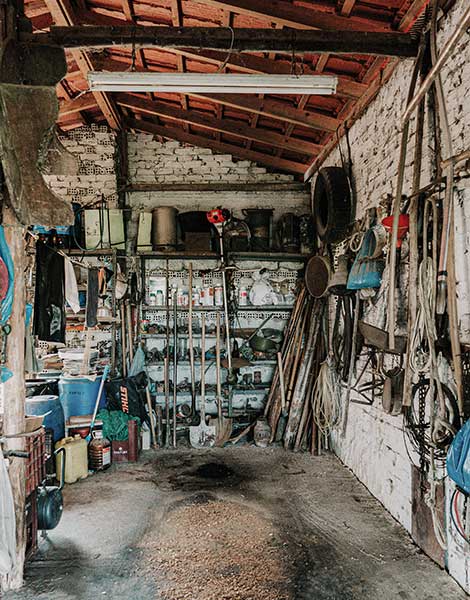
© Vicky Tsatsampa
Boutari
The Boutari Company began its journey in 1879. Over the last 144 years, it has made numerous accomplishments, including pioneering new wine paths and experiences, such as wine tourism and the first experimental labels, as well as establishing itself as a key player in the evolution of Greek winemaking. In 2022, the company was acquired by the Sterner Stenhus Greece investment group. It produces more than 35 labels from its five wineries.
Info
Stenimahos, Tel. (+30) 23320.597.00
Tazoglidou
Eustratia Tazoglidou was born in Melbourne. She studied agronomy at the Aristotle University of Thessaloniki and has since lived and worked amongst vineyards. Today, she produces four labels, totaling approximately 10,000 bottles, from Xinomavro, Montepulciano, Vidiano, and Kydonitsa grapes from privately owned vineyards.
Info
Trilofos, Tel. (+30) 697.900.0660
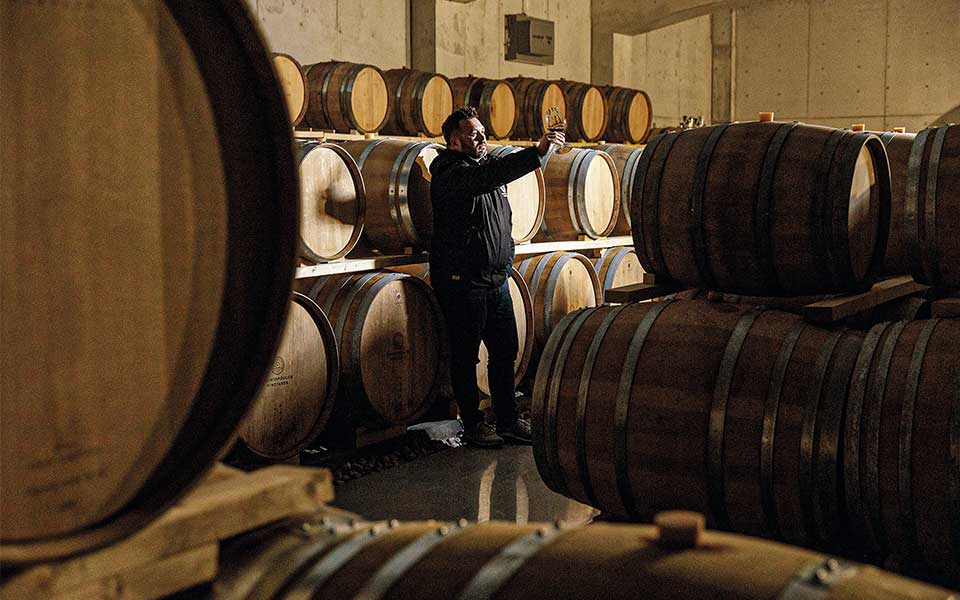
© Konstantinos Tsakalidis
Marras Winery
Wine has always been present in the home of Socrates and Thanasis, in some form or another. They remember the smell of alcoholic fermentation in the alley outside. Their father worked as an oenologist at the cooperative for 25 years, so their future was somewhat predetermined – Socrates, 27, studied oenology, while Thanasis, 32, studied agronomy. The family planted their first vineyard in 2000 and 15 of its 20 acres are dedicated to Xinomavro. They produce red, rosé, and white wines from organically grown grapes. “Our goal is to make good wine with as few interventions as possible.”
Info
Naoussa, Tel. (+30) 697.859.9792, 697.583.7021
Vaeni Cooperative
The winemaking cooperative has been in operation for 40 years and has 250 members, who contribute nearly half of the Naoussa region’s production to the winery. Its wine cellar is a veritable treasure trove. Among the 40 labels they produce, five are Naoussa PDOs, demonstrating the region’s rich variety. Their freshest Naoussa is aged for six months in the barrel and six in the bottle. The cooperative exports to 40 countries across Europe, Asia, Australia, and America.
Info
Episkopi, Tel. (+30) 23320.442.74
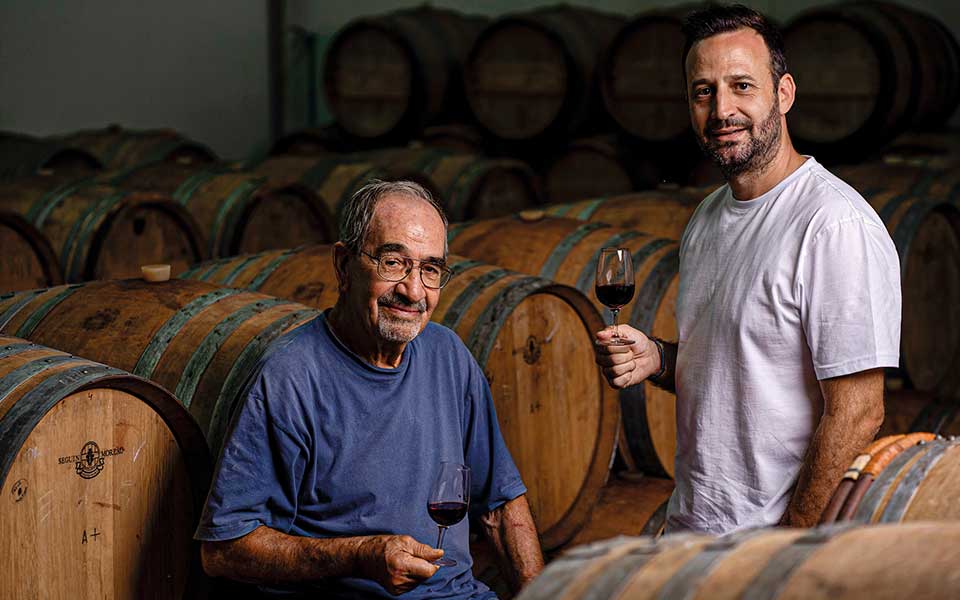
© Vicky Tsatsampa
Dalamara Winery
The family winery was established in 1991, although written sources and stories from Kostis Dalamaras’ grandmother attest to the family’s commercial activity as wine producers and merchants in Naoussa since the late 19th century. Continuing the family winemaking tradition, Kostis took over the family business in 2010, after studying viticulture and oenology in Beaune and working in famous vineyards in Burgundy, Catalonia, and Tarragona. This wealth of experience in the production of great red wines is evident in his own Xinomavro.
In 2019, he drew the attention of top New York Times wine critic Eric Asimov thanks to the beautiful tannins of his wines and was featured in an article that focused solely on indigenous Greek varieties. And with good reason. Thirteen years after his first official harvest as “captain” of the winery, he has produced wines that continue to reflect his personal style. He keeps intervention to a minimum, admitting that most of the work is done in the vineyard, where he practices organic farming and fertilizes with his own compost. His Paliokalias, made with grapes from the area’s prime vineyard, is a masterpiece.
Info
Naoussa, Tel. (+30) 23320.283.21
Oenos Mittas
Yiannis Mittas does not come from an agricultural background or family. His studies as an agronomist in Florina led to an internship with the Vaeni Cooperative in 2016. At the end of 2017, he purchased his own eighteen-acre vineyard on the hill of Paliokalias, producing some 1,000 bottles in 2019. Last year’s vintage produced 3,400 bottles, and this year’s is expected to yield twice as many. His delicious Xinomavro, grown organically with few additives, is a delightful new addition to the region’s selection of wines.
Info
Naoussa, Tel. (+30) 697.379.3890
Argatia Winery
“Argatia” means “cooperation” in Pontic, expressing the importance of the collective spirit. Dr. Haroula Spintharopoulou, an oenologist, and her husband, Panagiotis Georgiadis, founded the winery in Rodohori, and have recently handed over the reins to their children. Oenologist Christoforos, along with Konstantinos Georgiadis and Theodora Dagalakou, produce around 15,000 bottles annually. Six of the seven labels they bottle are Xinomavro-based. Their standout wines are the Naoussas, which are stylish, peppery, well-structured, and have significant aging potential.
Info
Rodohori, Tel. (+30) 697.626.9759
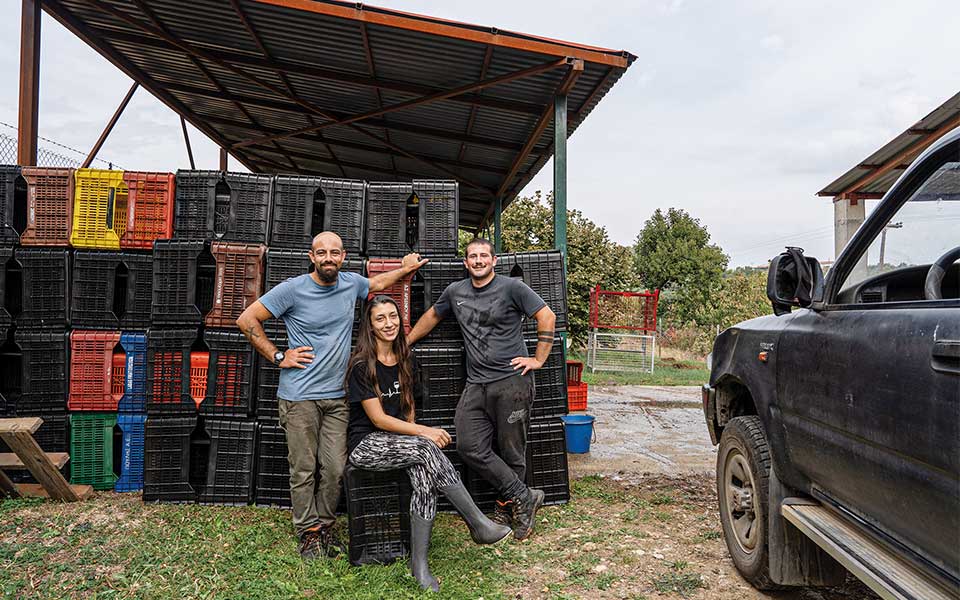
© Vicky Tsatsampa
Taralas Winery
What the father did as a hobby, the son turned into a profession. In 2006, the Taralas family established a winery in Fitia, and Christos now produces 50,000 bottles from the family’s own organic vineyards, which are grown on a plot of land measuring approximately 70 acres. They use indigenous yeasts and want their Xinomavro to retain its identity.
Info
Patrida Imathias, Tel. (+30) 697.302.9499
Kappa Winery
Until 2019, Tasos worked as an executive consultant. He took over the family vineyards with his partner, Eleni, and built the winery in Aggelohori Imathias in 2021. Today, he manages 25 acres of vineyards planted with Xinomavro, Syrah, Cabernet Sauvignon, Assyrtiko, and Malagousia. The X/Loco tastes as crazy as it sounds, while the Kokkymelo 2021 is a Xinomavro with strawberry and red fruit flavors, earthy aromas, and subtle barrel notes. This is the only label we tasted outside the PDO zone, as the winery is practically adjacent to the region and some of its vineyards are located within it.
Info
Aggelohori, Tel. (+30) 697.179.5499
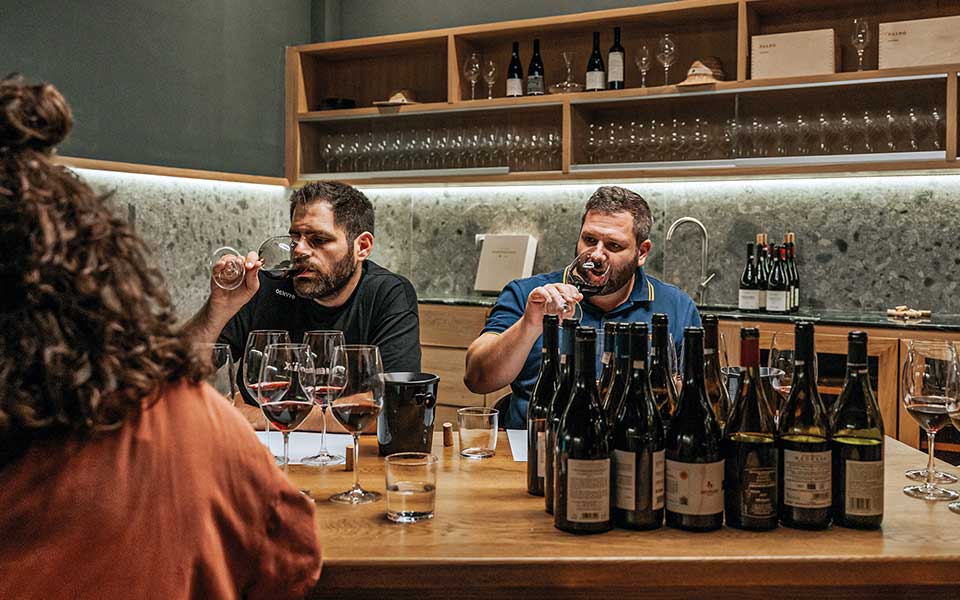
© Vicky Tsatsampa
Markovitis Winery
Markos Markovitis carries on his father’s and grandfather’s legacy in the middle of nowhere. The winemaker and viticulturist took a risk when he decided to replant the 120-acre family vineyard with only Xinomavro after completing his studies in Germany. His “less is more” philosophy – he produces only two labels and 80,000 bottles – yields impressive results. His wines are expressive, and discerning consumers will recognize in them the hand of a very skilled winemaker.
Info
Polla Nera, Tel. (+30) 693.406.3788
Klonas Winery
Scattered across a hill in Vermio, the vineyards of Klonas Winery are located in the center of the PDO zone. Their wines make the most of Paliokalias’ perfect terroir, highlighting the Xinomavro and white Preknadi grape varieties, while simultaneously exploring the winemaking potential of other varieties such as Syrah, Merlot, Assyrtiko, and Malagousia. They bottle six wines, including an extremely limited-production Naoussa PDO, which is perhaps the most elusive wine in its category.
Info
Paliokalias, Tel. (+30) 23320.289.52
Lousis Vineyards
In 1981, the Lousis family from Thessaloniki acquired its first vineyards on the outskirts of Vermio, at an altitude of 280 meters. Today, George Lousis produces three labels from the organically grown vineyard: a Retsina, a white Vidiano and Roditis blend, and a traditional Xinomavro, in quantities of 6,000-7,000 bottles.
Info
Polla Nera, Tel. (+30) 693.253.0483

